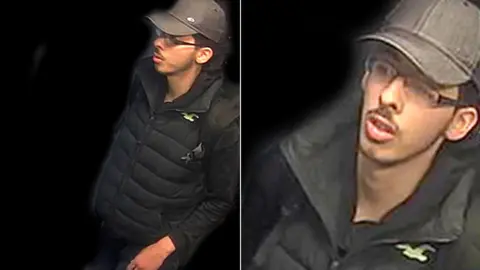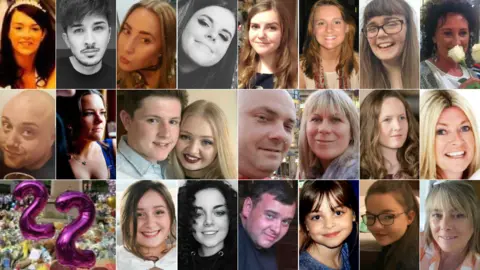Manchester Arena Inquiry: Bomber's messages held 'for years' before attack
 Greater Manchester Police
Greater Manchester Police Messages between the Manchester Arena bomber and an Islamic State recruiter were held by police for years, but the killer was not identified until months after the attack, an inquiry has heard.
The inquiry into the atrocity was told the texts showed Salman Abedi providing his full name and discussing martyrdom.
They were found on a phone seized from Abdalraouf Abdallah in November 2014.
The subsequent prosecution of Abdallah relied on the messages, but police did not immediately identify Abedi.
The Manchester Arena Inquiry has been looking at what was known about Abedi before the May 2017 bombing, which killed 22 people and injured hundreds more.
The hearing was told police first realised the relevant messages were from the bomber in 2018.
Abdallah was jailed in July 2016 for facilitating the movement of extremist fighters and money to Syria.
'An interpretation'
Nicholas De La Poer QC, counsel to the inquiry, said one message from Abedi included audio that spoke of "soldiers of sacrifice advancing forward and the crushing the stronghold of the enemy".
He said the texts showed Abdallah "promoting the idea of martyrdom, talking about maidens of paradise" to a contact named Salman.
Det Ch Supt Dominic Scally, the head of Counter Terrorism Policing North West, was asked if the messages showed an attempt to radicalise Abedi.
"I understand that's an interpretation of it," he said.
The court heard another text contained the full name Salman Abedi, but Det Ch Supt Scally confirmed detectives did not put a name to the user until 2018.
 Family handouts
Family handoutsOne exchange showed Abdallah saying he asked Allah for martyrdom, with Abedi responding "Oh lord! Amen".
In a text from the day before Abdallah was arrested, Abedi had written: "May Allah make us depart from this world."
In other message, Abedi had described martyrdom as a "nice thing" and mentioned the name of someone who had died.
The inquiry was told that a basic subscriber check on the number would have identified Abedi, but no such check took place.
Det Ch Supt Scally said the detective responsible had made no "efforts to identify the individual".
Questioned by a barrister for the bereaved families, the officer said his "preference would have been that should have been lifted up and put into the intelligence system".
Asked whether police had had enough information to have made an earlier identification, he said: "I think we would have established that."
 PA Media
PA MediaThe inquiry was told that the prosecution of Abdallah had actually relied on the messages to show the defendant was an Islamic extremist promoting the idea of martyrdom.
Det Ch Supt Scally also said that counter terror police were not informed by MI5 about two pieces of intelligence about Abedi which were received before the attack and were now seen as highly relevant to the plot.
The inquiry is investigating how MI5 responded to the intelligence, which is classed as too sensitive to be publicly disclosed during the hearings, and the admission was the first time police have confirmed the intelligence had not been shared with detectives before the blast.
The inquiry also heard about an occasion when Abedi's elder brother Ismail was stopped entering the UK in September 2015.
Det Ch Supt Scally said police found "extremely unpleasant material" on a phone that was seized.
A subsequent search of Ismail Abedi also uncovered "extremist terrorist material" and a publication "regarded by some terrorists as being the seminal ISIS text", the court heard.
The inquiry also heard how in May 2016, police thought Abdallah might be intending to break his bail conditions by going abroad with Salman Abedi, but that ultimately Abedi travelled with someone else.
During exchanges on why Abedi was not referred to the Prevent de-radicalisation programme when MI5 stopped investigating him in 2014, Mr De La Poer asked the detective if he agreed it was a "highly unsatisfactory state of affairs" that no record of the decision was kept by police.
"Yes, I think we should be able to record our decision-making in an appropriate manner," he replied.
However, the witness said he did not think a referral should have been made "in the circumstances", prompting chairman Sir John Saunders to point out Abedi had been "in regular contact with someone who was a terrorist".
The inquiry was later told Abedi's father Ramadan was stopped by police at the UK border a "number" of times in 2011 and that, on one occasion, he was noted to be with his son.
The inquiry continues.

Why not follow BBC North West on Facebook, Twitter and Instagram? You can also send story ideas to [email protected]
